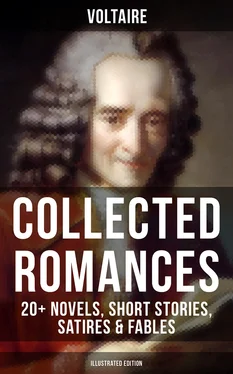"O Zadig," said she, on opening her eyes, and beholding her deliverer, "I loved thee formerly as my intended husband, I now love thee as the preserver of my honor and my life!"
Never was heart more deeply affected than that of Semira. Never did a more charming mouth express more moving sentiments, in those glowing words inspired by a sense of the greatest of all favors, and by the most tender transports of a lawful passion. Her wound was slight, and was soon cured. Zadig was more dangerously wounded. An arrow had pierced him near his eye, and penetrated to a considerable depth, Semira wearied heaven with her prayers for the recovery of her lover. Her eyes were constantly bathed in tears; she anxiously waited the happy moment when those of Zadig should be able to meet hers; but an abscess growing on the wounded eye, gave everything to fear. A messenger was immediately dispatched to Memphis, for the great physician Hermes, who came with a numerous retinue. He visited the patient, and declared that he would lose his eye. He even foretold the day and hour when this fatal event would happen.
"Had it been the right eye," said he, "I could easily have cured it; but the wounds of the left eye are incurable."
All Babylon lamented the fate of Zadig, and admired the profound knowledge of Hermes. In two days the abscess broke of its own accord, and Zadig was perfectly cured. Hermes wrote a book, to prove that it ought not to have been cured. Zadig did not read it: but, as soon as he was able to go abroad, he went to pay a visit to her in whom all his hopes of happiness were centered, and for whose sake alone he wished to have eyes. Semira had been in the country for three days past. He learned on the road, that that fine lady, having openly declared that she had an unconquerable aversion to one-eyed men, had the night before given her hand to Orcan. At this news he fell speechless to the ground. His sorrows brought him almost to the brink of the grave. He was long indisposed; but reason at last got the better of his affliction; and the severity of his fate served even to console him.
"Since," said he, "I have suffered so much from the cruel caprice of a woman educated at court, I must now think of marrying the daughter of a citizen."
He pitched upon Azora, a lady of the greatest prudence, and of the best family in town. He married her, and lived with her for three months in all the delights of the most tender union. He only observed that she had a little levity; and was too apt to find that those young men who had the most handsome persons were likewise possessed of the most wit and virtue.
Table of Contents
One morning Azora returned from a walk in a terrible passion and uttering the most violent exclamations.
"What aileth thee," said he, "my dear spouse? What is it that can thus have disturbed thee?"
"Alas!" said she, "thou wouldst have been as much enraged as I am, hadst thou seen what I have just beheld. I have been to comfort the young widow Cosrou, who, within these two days, hath raised a tomb to her young husband, near the rivulet that washes the skirts of this meadow. She vowed to heaven, in the bitterness of her grief, to remain at this tomb whilst the water of the rivulet should continue to run near it."
"Well," said Zadig, "she is an excellent woman, and loved her husband with the most sincere affection."
"Ah!" replied Azora, "didst thou but know in what she was employed when I went to wait upon her!"
"In what, pray tell me, beautiful Azora? Was she turning the course of the rivulet?"
Azora broke out into such long invectives, and loaded the young widow with such bitter reproaches, that Zadig was far from being pleased with this ostentation of virtue.
Zadig had a friend named Cador; one of those young men in whom his wife discovered more probity and merit than in others. He made him his confidant, and secured his fidelity as much as possible by a considerable present. Azora, having passed two days with a friend in the country, returned home on the third. The servants told her, with tears in their eyes, that her husband died suddenly the night before; that they were afraid to send her an account of this mournful event; and that they had just been depositing his corpse in the tomb of his ancestors, at the end of the garden. She wept, she tore her hair, and swore she would follow him to the grave. In the evening, Cador begged leave to wait upon her, and joined his tears with hers. Next day they wept less, and dined together. Cador told her, that his friend had left him the greater part of his estate; and that he should think himself extremely happy in sharing his fortune with her. The lady wept, fell into a passion, and at last became more mild and gentle. They sat longer at supper than at dinner. They now talked with greater confidence. Azora praised the deceased; but owned that he had many failings from which Cador was free.
During supper, Cador complained of a violent pain in his side. The lady, greatly concerned, and eager to serve him, caused all kinds of essences to be brought, with which she anointed him, to try if some of them might not possibly ease him of his pain. She lamented that the great Hermes was not still in Babylon. She even condescended to touch the side in which Cador felt such exquisite pain.
"Art thou subject to this cruel disorder?" said she to him, with a compassionate air.
"It sometimes brings me," replied Cador, "to the brink of the grave; and there is but one remedy that can give me relief—and that is, to apply to my side the nose of a man who is lately dead."
"A strange remedy, indeed!" said Azora.
"Not more strange," replied he, "than the satchels of Arnou, against the apoplexy."
This reason, added to the great merit of the young man, at last determined the lady.
"After all," says she, "when my husband shall cross the bridge Tchinavar in his journey to the other world, the angel Asrael will not refuse him a passage because his nose is a little shorter in the second life than it was in the first."
She then took a razor, went to her husband's tomb, bedewed it with her tears, and drew near to cut off the nose of Zadig, whom she found extended at full length in the tomb. Zadig arose, holding his nose with one hand, and putting back the razor with the other.
"Madam," said he, "don't exclaim so violently against the widow Cosrou. The project of cutting off my nose is equal to that of turning the course of a rivulet."
III.
THE DOG AND THE HORSE.
Table of Contents
Zadig found by experience, that the first month of marriage, as it is written in the book of Zend, is the moon of honey, and that the second is the moon of wormwood. He was some time after obliged to repudiate Azora, who became too difficult to be pleased; and he then sought for happiness in the study of nature.
"No man," said he, "can be happier than a philosopher, who reads in this great book, which God hath placed before our eyes. The truths he discovers are his own; he nourishes and exalts his soul; he lives in peace; he fears nothing from men; and his tender spouse will not come to cut off his nose."
Possessed of these ideas, he retired to a country house on the banks of the Euphrates. There he did not employ himself in calculating how many inches of water flow in a second of time under the arches of a bridge, or whether there fell a cube-line of rain in the month of the mouse more than in the month of the sheep. He never dreamed of making silk of cobwebs, or porcelain of broken bottles: but he chiefly studied the properties of plants and animals; and soon acquired a sagacity that made him discover a thousand differences where other men see nothing but uniformity.
One day, as he was walking near a little wood, he saw one of the queen's eunuchs running toward him, followed by several officers, who appeared to be in great perplexity, and who ran to and fro like men distracted, eagerly searching for something they had lost of great value.
Читать дальше












